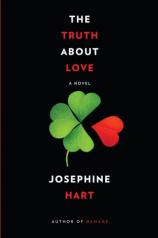Reading Group Guide
Discussion Questions
The Truth About Love

1. The novel's title is The Truth About Love. What do you think Hart's “truth about love” really is? What would each narrator say?
2. Reread the epigraph, from Gottfried Benn. Now that you've read the novel, how do you understand it? Has your understanding changed from when you first read it?
3. Discuss the opening scenes. What were you thinking as you read these pages? Why didn't the boy want his mother to see him?
4. On page 24, Middlehoff describes himself as “an observer and a stranger, the one I feel almost essential to the other. The elective outsider, the truthful observer of the scene requires an anatomical eye, which I have endeavoured over the years to develop.” Is he right about the necessity of detachment to be a truthful observer? Does he manage to become one?
5. Why is the gate so important to the O'Haras? To Middlehoff?
6. Several times in the novel, Tom O'Hara asserts, “Living close to what is lost, that's the only way.” Do you agree with this? Which characters don't, and why?
7. On page 33, Middlehoff tells Tom, “After a tragedy, many survivors are lost.” What does this mean? Which survivors are lost in this story?
8. Discuss the character Harriet Calder. What is her purpose in the novel? Why does Middlehoff accept her behavior?
9. Erik Middlehoff's book on Ireland was to be entitled The Weapons of the Country, with the categories Language, Love, and Memory. In what ways are these weapons to the Irish? Which is most powerful?
10. On page 71, Bishop Fullerton says, “There's a world of difference between a free nation building its soul on the tales of men who fought hard and long against a ruthless oppressor and breaking young minds with the weight of old sadnesses and burdening young shoulders with an unpayable debt to ghosts.” What is he referring to? Do you think the O'Haras would agree?
11. Middlehoff says his father “said a nation could forget, exploit, obscure, or live with its history” (page 72). Which does Ireland do? And Germany?
12. What role do fathers play in the novel? And mothers? Who is more influential?
13. Reread the passage on pages 122-3 that begins “Poor Olivia.” Is Sissy right about her legacy?
14. Why do you think Olivia is successful as an actress? How has her life prepared her for it?
15. On page 154, Olivia wonders if, in his book, Middlehoff was “trying to warn us? Or give us absolution?” What is she referring to?
16. Olivia says very little about her husband and children. Why is that?
17. Several times in the novel, characters talk about “the love of my life.” What do they mean when they say that? Who truly has found that kind of love?
18. Discuss Middlehoff's revelations on page 175, and his speech on page 183. How does the notion of guilt-both individual and collective-affect the characters in this novel?
19. Compare Tom O'Hara's love for Sissy with Thomas Middlehoff's love for Harriet. How are they different? How similar? And the women themselves?
20. Why does Bogus become so important to Olivia's story?
21. How much did you know about Ireland's history before reading this novel? Do you now want to learn more?
22. Reread the closing paragraph of the novel. Why does Olivia say that Middlehoff understood?
Suggested Reading
Remembrance of Things Past by Marcel Proust; Primal Vision by Gottfried Benn; Elective Affinities by Johann Wolfgang von Goethe; Irish Journal by Heinrich Böll; Peeling the Onion by Günter Grass; Atonement by Ian McEwan; The Gathering by Anne Enright.
The Truth About Love
- Publication Date: August 11, 2009
- Hardcover: 224 pages
- Publisher: Knopf
- ISBN-10: 0307272613
- ISBN-13: 9780307272614







